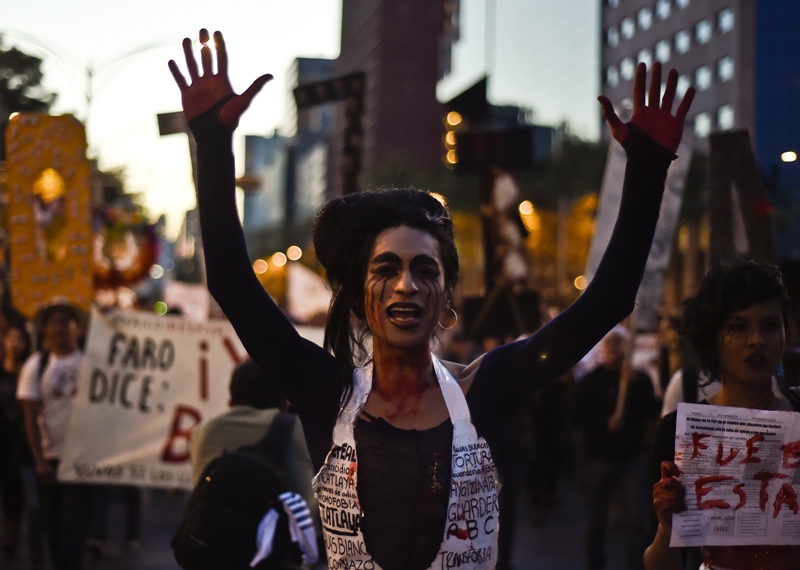TIXTLA, Mexico – The men are holed up with their buses on the college’s soccer field, sleeping in the compartments that once held passenger luggage and hanging the clothes they’ve hand-washed from the windshields.

While attention has focused on the kidnapping and disappearance of 43 students from the Raul Isidro Burgos teachers college in Tixtla, few have paid much attention to the three dozen or more bus drivers who say they are being forced by activists from the school to live as captives and act as chauffeurs for the very people who commandeered their vehicles.
The drivers, some of whom have been at the southern Mexico school more than a month, say they cannot abandon the buses because their companies hold them financially responsible for the vehicles, some of which are worth well over a hundred thousand dollars. And with authorities unwilling to inflame tensions over the disappearance and presumed massacre of students from the school, no one is coming to their rescue.
“They say we aren’t kidnapped because we can get out and walk around, or swim in the (campus) pool,” said one driver who, like the others holed up at the school, refused to give his name for fear of angering the students. “But a prison inmate can also go out to the exercise yard or the gym, and that doesn’t mean they’re free.”
The students, who have a long history of sometimes violent activism, have justified the mass bus seizure as “an expropriation” and say they need the vehicles to ferry them to and from the many protests that have erupted in Guerrero state since the Sept. 26 disappearance and likely killing of their colleagues. Omar Garcia, a second-year student at the school, acknowledged it has put the drivers in a bad spot, unable to leave or earn a living to feed their families. But he told The Associated Press the students had no other choice, since they don’t know how to maintain the buses or drive such large vehicles.
Drivers have begged their employers to send replacements so they can go home and see their families. So far most companies have refused, though Garcia said an agreement was in the works between the students and the bus owners that would allow drivers to rotate out every 10 days. Several bus companies with vehicles at the school declined to comment, except to acknowledge that they hold the drivers responsible for the vehicles as a matter of policy. The companies say hijackings have become such a frequent problem that some lines have cut back on runs through southern Guerrero state.
The plight of the drivers at the teachers college is just one example of the government’s inability to keep the peace in Guerrero state since the students disappeared, allegedly on orders from a local mayor whose corrupt police handed them over to drug traffickers.
Masked students also control toll booths to collect “donations” from motorists passing on the federal highway and hijack passenger buses for their own use. Protesters from a local teachers’ union have burned vehicles, public buildings and the offices of political parties, all while federal and state police stood nearby.
The disappearance of the students has ignited public outrage, with near-daily protests against a government blamed both directly and indirectly for their fate. Such tension has complicated any attempt to help the bus drivers.
“The police … are not taking action at this moment to avoid giving the appearance of acts of repression,” said Guerrero state prosecutors’ spokesman Jorge Valdez.
“It is the concept of not trying to put out a fire by pouring more gasoline on it.”
The state’s new governor, a former leftist rebel himself, is “looking for a mechanism of conciliation, negotiation, persuasion – a political mechanism” to control the groups, Valdez said.
Authorities also wish to avoid a repeat of an incident three years ago, when police shot and killed two young men from the school while trying to clear a student roadblock. A dozen officers were arrested and two of them charged.
The soccer field has become a parking lot for not only the buses, but for seized delivery trucks that once held Coca-Cola and goods from milk, cheese and snack companies. The drivers said the students looted the goods and sold the merchandise to local vendors.
One bus driver said he has been held since Oct. 24 when he was stopped while driving about a dozen passengers to Acapulco. A group of students blocked a road near Chilpancingo and threatened to pelt the bus with rocks unless he opened the door. The students, he said, boarded and ordered the passengers to get off.
On a recent day, a hijacked gas tanker sat on the field near about 30 luxury buses from the lines that carry Mexico City vacationers to and from Acapulco. All of the buses are late model, with leather seats and individual televisions.
“They know perfectly well which ones are the new ones,” another driver, who also feared giving his name, said of the students.
Associated Press reporters discovered the captive drivers while reporting on the missing students, and had to talk quickly before students shooed them away.
One driver warned journalists, “if they see you talking to us, they’ll break your camera.”
A pair of students approached reporters as they left the lot. “Who gave you permission to be here?” they asked in angry tones.
The men, who are fed simple meals by the students, said their companies do not pay them for their time as captives. While the students have promised to give them money when they are released, the drivers say that if they do receive anything, it won’t come close to their normal earnings of nearly 20,000 pesos ($1,500) per month.
“I haven’t had a check for a month. I have to ask for a line of credit that I can’t pay,” said another driver, who was shirtless because he was hand-washing his only set of clothes. “I’m being ruined.”


Comments